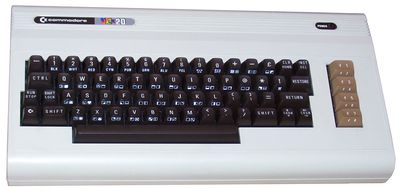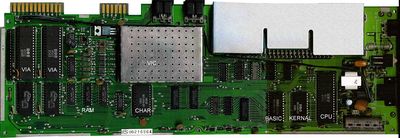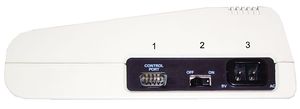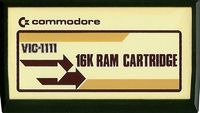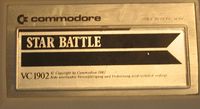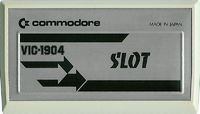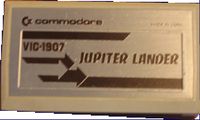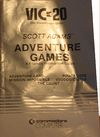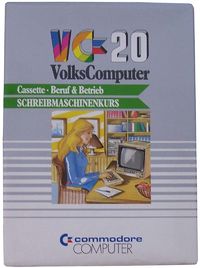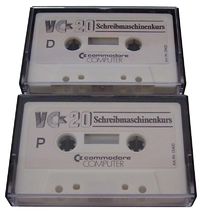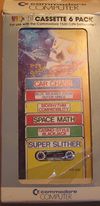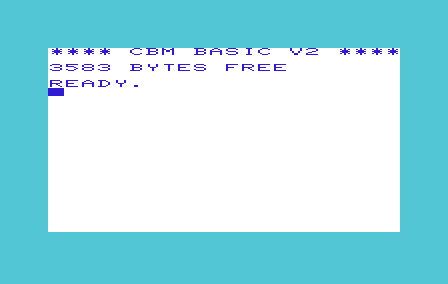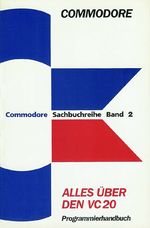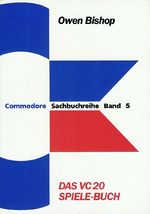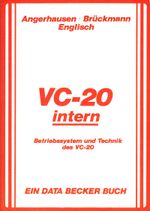VIC-20
| VIC-20 | |
| Type: | Home Computer |
| Producer: | Commodore |
| Price: | 299 US$; (Germany: 1,000.- DM; approx. 500 €) |
| Released: | 1981 |
| Discontinued: | 1985 |
| Processor: | MOS 6502 @ approx. 1 MHz |
| Memory: | 5 KByte, upgradeable up to 40 KByte |
| OS: | BASIC V2.0 |
| Info: | alias VC-20 and VIC-1001 Follower: C64 |
The VIC-20 is the predecessor of the C64. It was marketed as the VC-20 in German-speaking areas, and as the VIC-1001 in Japan. The VIC-20 was produced from 1981 to 1985.
Introduction[edit | edit source]
The VIC-20 was Commodore's first color home computer. Released in 1981, it sold for $299.95 (1,000 DM) and was the year’s best-selling home computer. International Computer Magazine considered it a compact, user-friendly home computer suitable for inexperienced users, and they awarded it "Computer of the Year."
Despite having only 5 KByte RAM, it spawned thousands of software programs and games, available on cassette and cartridge. 1980s computing magazines published cheap programs for users to type in.
Commodore named the VIC-20 after its VIC (Video Interface Chip) processor. In Germany, the VIC-20 sold as the VC-20, meaning Volkscomputer (The People's Computer), because with the German accent and language, VIC sounds rather immoral.
VIC-20 sales exceeded one million units, making it the first computer to sell this many, and in total it sold over three million.
Construction[edit | edit source]
The VIC-20 looks almost identical to the C64.
It is a keyboard computer and has the following ports and interfaces:
Backside[edit | edit source]
- Expansion port (44-pin I/O) to connect cartridges
- Audio-/Video (5-pin output) to connect a VIC-1510/1701/02/1804 monitor, or to a television with a RF modulator.
- Serial Bus (IEEE-488, 6 pin I/O) to connect a diskdrive VIC-1540/41/70/71/81 or a printer MPS-801/802/803, VIC-1515/1525/1526
- Cassette/Datasette connector (Cassette port 12-pin I/O) to connect a cassette recorder (Datasette) VIC-1530 or CN2
- User port (RS-232 or Centronics; 24-pin I/O) to connect cartridges, reset buttons or modems (beware: the user port is incompatible to the user port of the C64/C128!)
Right Side[edit | edit source]
- One game port (controlports, 9-pin input) to connect a joystick, lightpen, mouse or a pair of paddles
- Power switch
- Power connector (early variants had 2 pins; newer variants have a 7 pin DIN plug) to connect the power supply
Mainboard[edit | edit source]
The internal components differ from that of the C64:
- Processor: MOS 6502 with 1.02 MHz (NTSC)/ 1.10 MHz (PAL)[1]
- Memory: 5 KByte static RAM, with 3583 bytes free and usable by BASIC, expandable up to 40 KByte (up to 27.5 KByte usable by BASIC).
- ROM: 20 KByte in total, consisting of
- CBM BASIC V2.0 (8 KByte)
- KERNAL (8 KByte)
- Charset (4 KByte)
- Graphics: VIC-I 6561
- Text mode (uppercase letters/graphics character set or uppercase/lowercase letters): 22 (columns) × 23 (rows) characters
- Graphic mode (HiRes): 176×184 pixels
- In 8 colors, 8 border colors and 16 background colors (color) or multicolor (4 colors): 88×184 pixels
- Sound: The VIC-I 6561 is used for sound generation (3 pulse wave generators and 1 white noise generator with a total range of about 128 notes)
- Keyboard: 66 keys (QWERTY), with multiple characters on each key
- Others: Interface chip VIA 6522 for I/O control
- Dimensions: 403×204×72 mm
- Weight: ~ 1800 g
- Power supply: 9 V~ with a 220 V/50 Hz AC power supply
- Power consumption: 25 W
Accessories[edit | edit source]
- The cassette or datasette drive VIC-1530 and other Commodore datasettes (outside VC-1531)
- The disk drive VIC-1540 was especially developed for the VIC-20. The successor are the 1541, 1570/71/81 and can be used in the VIC-20 mode.
- Serial printer like the matrix printer CR-variant VIC-1515 or VIC-1525/26.
VIC-20 Cartridges[edit | edit source]
- 3K RAM Cartridge VIC-1210 upgrades the memory to 8 KByte, with it 6655 characters (bytes) can be used in total. Memory extensions up 35K, expanding the system to a maximum of 40 KByte are possible (with a maximum of 27.5 KByte useable for BASIC programs), e.g. with the 16K RAM cartridge VIC-1111 and 8K RAM Cartridge VIC-1110. Third-party memory expansion cartridges:
- RAM module with 27/32 KByte (Hard- & Software Klaus Jeschke, with jumper for selecting the memory size and configuration)
- Big Block, 16 KByte (MSD Inc.)
- Vixen, 16 KByte (Stonechip Electronics, with Jumper for selecting memory size and configuration)
- Super X2 Expansion Pack, 64 KByte (Visount, with jumper for selecting memory size and configuration)
- Super Expander Cartridge (VIC-1211)/Super Expander Cartridge with 3K RAM (VIC-1211A): the latter includes also 3 KByte RAM, both have additional BASIC commands for hires graphics and plotting, function key support and piano keyboard for music writing
- Programming Help Module (VIC-1212) with help tools, Assembly monitor and better support of function keys
- Assembler Module (VIC-1213)
- Expansion Module (VIC-1010 or VIC-1020), which allows to connect up to 5 cartridges and switching between them.
- BASIC extensions such as Waterloo Structured BASIC (VIC-1001, a Commodore Canada release only), BASIC (VIC-1801) or other programming languages like VIC-Forth (VIC-2013, from HES too)
- IEEE-488 Connection Module (VIC-1112), which allows the user to connect more peripherals
- VIC Voice Synthesizer (VIC-1214)
- The IEEE-488 Connection Module (VIC-1011) for additional peripherals and scientific/technical instruments or the Relay Module (VIC-1900).
- The Connection Separator MBS-CP (VIC-4012) to connect additional computers to one peripheral and one Remote Control Switch (VIC-4011).
- Connection of modems with the V.24 connection module (VIC-1011A as terminal type or VIC-1011B as current loop type) on the Userport
- VICMODEM Telephone Interface Cartridge (VIC-1600) and Adapter Module (VIC-1605)
- VICterm 40 (VIC-1610)
Game Cartridges[edit | edit source]
From Commodore released game cartridges:
VIC/ | Name of Cartridge VC-No | ------|------------------------------------------------- 2011 | Statistic module (application) 2012 | VIC-Graph (German: Kurvendiskussion; Application) 2013 | VIC-Forth (programming language) 1901 | Avenger / VIC Avenger (German: Alpha-Alarm) 1902 | Star Battle / Galaxian 1903 | Rally-X 1904 | Slot / Super Slot (German: Las Vegas) 1905 | Jelly Monsters / Pacman (German: Steinbeisser) 1906 | Alien / Super Alien (German: Monster Alien) 1907 | Jupiter Lander (German: Landung auf Jupiter) 1908 | Poker / Draw Poker (German: StarPoker) 1909 | Road Race / Midgnight Race / Knight Drive (German: Nacht-Rallye) 1910 | Radar Ratrace / Radar Rat Race / Rally-X? (German: Katz und Maus) 1911 | The Sky is Falling / Sky Hole (German: Sterntaler) 1912 | Mole Attack / Mole Hitting (German: Hau den Lukas) 1913 | Raid on Fort Knox / Bank Robber / Raiders (German: Räuber und Gendarm) 1914 | Adventure Land (German: Logik Abenteuer 1, Scott Adams Adventure Series 1) 1915 | Pirates Cove (German: Logik Abenteuer 2) 1916 | Mission Impossible (German: Logik Abenteuer 3) 1917 | The Count (German: Logik Abenteuer 4) 1918 | Voodoo Castle (German: Logik Abenteuer 5) 1919 | Sargon II Chess / Chess (German: Schachprogramm Sargon II) 1920 | Pin Ball / Pinball Spectacular 1921 | Super Smash 1922 | Cosmic Cruncher 1923 | Gorf 1924 | Omega Race 1925 | Money Wars 1926 | Menagerie 1927 | Cosmic Jaillbreak 1928 | Home Babysitter 1929 | Personal Finance (application) 1930 | Visible Solar System (application) 1931 | Clowns 1932 | Garden Wars 1933 | Speed Math & Bingo Math (educational program) 1934 | - 1935 | Commodore Artist 1936 | Phoenix-Clone (never released) 1937 | Seawolf (Paddle game) 1938 | Tooth Invaders 1939 | Star Post 1940 | - 1941 | Number Nabber & Shape Grabber
Datasette[edit | edit source]
Many Commodore datasettes exist for the VIC-20:
Games[edit | edit source]
- Highway (german: Autobahn; Art.-No. 130170)
- Auto-Rallye (Art.-No. 130010)
- 17+4 (Black Jack; Art.-No. 130070)
- Black Max (Art.-No. 130120)
- Brennball (a german game, sometimes in the USA called 'Kickball'; Art.-No. 130110)
- China Clan (Art.-No. 130230)
- Earth Defense (Art.-No. 130130)
- Drive Simulator (german: Fahrsimulator; Art.-No. 130150)
- Dangerous Rain (german: Gefährlicher Regen; min. 8 KByte RAM; Art.-No. 130140)
- Gobang (Art.-No. 130180)
- Hell Driver (Art.-No. 130210)
- Invasion from Space (german: Invasion aus dem All; Art.-No. 130060)
- Canons (german: Kanonen; Art.-No. 130160)
- Bowl (german: Kegeln; Art.-No. 130200)
- Air Combat (german: Luftkampf; min. 3 KByte RAM; Art.-No. 130050)
- Owerri (min. 3 KByte RAM; Art.-No. 130190)
- Tank Battle (german: Panzerschlacht; min. 3 KByte RAM; Art.-No. 130220)
- Quizmaster (min. 8 KByte RAM)
- Spielautomat (Art.-No. 130030)
- Super-Cobra (Art.-No. 130020)
- Synthesizer (Music program; Art.-No. 130270)
- UFO (Art.-No. 130100)
- Vielsaitig (Music program, the name is a german word-play; Art.-No. 130260)
Applications[edit | edit source]
- Address Register (min. 8 KByte RAM; Art.-No. 140010)
- BASIC Course (Art.-No. 140020)
- Biology (Art.-No. 130290)
- Biorythmus (min. 3 KByte RAM; Art.-No. 130080)
- Christiani Compact Course (BASIC Course; Art.-No. 570040)
- Chemistry (Chemie; Art.-No. 130310)
- File (min. 16 KByte RAM; Diskette; Art.-No. 130370)
- Know your own IQ (Art.-No. 130320)
- Know your own personality (Art.-No. 130330)
- Mathematics 1 (Art.-No. 130280)
- Mathematics 2 (Art.-No. 130410)
- MiniMeb (min. 16 KByte RAM; Diskette; Art.-No. 130360)
- Physics (Art.-No. 130300)
- Fun of Calculation (german: Rechenspaß; Art.-No. 130240)
- Typewriter Training (german: Schreibmaschinenkurs; min. 16 KByte RAM; Art.-No. 130420)
- Simplicate (min. 16 KByte RAM; Diskette; Art.-No. 130550)
- Special Character Editor (Art.-No. 130030)
- Stock Control (min. 8 KByte RAM; Art.-No. 130390)
- Preschool programs (german: Vorschulprogramme; min. 8 KByte RAM; Art.-No. 130250)
- Writer (min. 8 KByte RAM; Diskette; Art.-No. 130385)
Software Collections[edit | edit source]
- VIC-20 Cassette 6-Pack (Entertainment with games and educational programs):
- Car Chase
- Blue Meanies from Outer Space
- Biorhythm (application)
- Space Math (educational program)
- Casino Math (educational program)
- Super Slither
- VIC-20 Cassette 6-Pack (applications):
- Personal Finance 1
- Personal Finance 2
- Loan/Mortgage Calculator
- Typewriter
- Home Inventory
- Expense Calendar
- VIC-20 Cassette 6-Pack (Mathematics):
- Backfire
- City Motel
- Five
- LCM Machine
- Numbowl
- Ruler Dueler
- Sector
- VIC-20 Cassette 6-Pack (Sampler):
- Alpha Draw
- Big Bad Wolf
- Crawler
- Music Synthesizer
- Super Seeker
- Treasure of the Bat Cave
Variants[edit | edit source]
Beside the Japanese version, there was also a Swedish version with special characters, and a French version for SECAM TVs.
Also, there were a number of variations of the VIC-20/VC-20 logo in the upper left corner of the case.
Usage[edit | edit source]
You must first connect the cables, insert a cartridge and turn on the peripherals before turning on the VIC-20.
You will then see the following screen with the blinking cursor (if the cartridge has a program on it, that will start up instead.):
**** CBM BASIC V2 **** 3583 BYTES FREE READY.
The blinking cursor indicates that the BASIC interpreter is ready for input. BASIC programs can be entered, loaded or saved at this point. CBM BASIC and BASIC commands are the same the C64 would use Commodore Basic V2. The VIC-20 differs from the C64 in the following ways:
- Way less BASIC memory with 3583 bytes (chars) free,
- It has a logical screen line of 88 chars (4 lines with 22 chars).
- The dimension of arrays with the BASIC command DIM is very limited - the use of 3 or 4 dimensions easily exceed the built-in memory and may require a memory expansion.
- Memory addresses used by the BASIC commands PEEK and POKE are different:
- Screen memory ranges from 7680 to 8185 containing character codes from 0 to 127 (128-255 mirrors the chars from 0-127)
- Color RAM ranges from 38400 to 38905 with the following colors:
- 0 Black
- 1 White
- 2 Red
- 3 Cyan
- 4 Violet
- 5 Green
- 6 Blue
- 7 Yellow
- The screen color (frame and background) can be changed with the memory address 36879 with values ranging from 0 to 255. First the frame color is used to be set (first 8 colors: black, white, red, cyan, violet, green, blue, yellow) followed by the background color (16 colors: the last 8, along with orange, light orange, pink, light cyan, light violet, light green, light blue, light yellow). Meaningful values are from 8 to 15, 24 to 31 or 248 to 255, because the frame color is limited to only 8 different colors (by using other values the text will be unreadable!).
- Sound: The memory addresses range from 36874 to 36877 with values from 128 to 255 for registers 1 to 4 (the 4th register is only for noise generation) and address 36878 with values from 0 to 15 for volume.
- Hint: The use of memory expansions (particularly the 3 KByte RAM cartridge) may change the memory layout and leads to other addresses!
List of books[edit | edit source]
|- |
| Publisher | Book |
|---|---|
| ARCsoft Publishers | 101 Programming Tips & Tricks for the VIC-20 and Commodore 64 |
| Birkhäuser | Explosive Spiele für Ihren VC20 |
| Commodore | Alles über den VC20 (Commodore Sachbuchreihe Band 2) Das VC20 Spiele-Buch (Commodore Sachbuchreihe Band 5) VC20 VolksComputer Handbuch (Bedienungshandbuch) VC20 Programmierhandbuch (identisch mit "Alles über den VC20") VC20 Service Manual (Technische Reparaturinformation) |
| Data Becker | VC-20 Intern VC-20 Tips & Tricks Das Casettenbuch zu Commodore 64 and VC-20 |
| DBV | Lerne Basic mit dem Volkscomputer VC20 |
| Hagemann | Besser programmieren mit dem VC20 |
| Haller | Messen, steuern, regeln mit dem VC-20 und C-64 |
| Hofacker | Programme für VC20 Spiele, Utilities, Erweiterungen |
| Hueber | Spiele für Ihren VIC-20 |
| Interface Age | Das Interface Age Systemhandbuch zum Commodore 64 und VC-20 |
| Kiehl Verlag | Die Floppy des Commodore 64 und VC-20 |
| Markt & Technik (Computer Persönlich) | Basic mit dem VC-20 Das VC-20 Buch Grafik mit dem VC-20 Programme und Tips für VC20 |
| Mc Graw Hill Boock Company | VC20 Anwenderhandbuch |
| Ravensburger | VC20/C64 (15 attraktive Nutz- und Spieleprogramme) |
| S+S Soft | VC20/64 Zwei Supercomputer unter der Lupe |
| Vogel | CHIP Spezial: Commodore VC20 Programme Ausgabe 1 und 2 |
Links[edit | edit source]
| Wikipedia: VIC-20 |
- VC-20 informations, Hard- and Software by vic20.de

- Manual for the MAC-Emulator Power20

- Another overview of VC-20 cartridges by www.zock.com

- VIC-20 Denial Wiki
Videos[edit | edit source]
- Video at YouTube VIC20 advertisement with Captain Kirk
- Video at YouTube VIC20 advertisement
